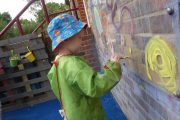 In the Early Years class (Nursery and Reception) we follow the Early Years Foundation Stage (EYFS) framework 2021, which sets the standards for the learning, development and care of children from birth to 5 years old. It promotes teaching and learning to ensure children’s ‘school readiness’ and gives children the broad range of knowledge and skills that provide the right foundation for good future progress through school and life.
In the Early Years class (Nursery and Reception) we follow the Early Years Foundation Stage (EYFS) framework 2021, which sets the standards for the learning, development and care of children from birth to 5 years old. It promotes teaching and learning to ensure children’s ‘school readiness’ and gives children the broad range of knowledge and skills that provide the right foundation for good future progress through school and life.
The Early Years Foundation Stage applies to children starting Reed First School at three years of age until the Summer after their 5th birthday. In our Foundation Stage class, we have both Nursery and Reception children.
Intent:
During their time in the Early Years Foundation Stage (EYFS), we aim to give our children broad, balanced and meaningful learning experiences to build essential foundations and prepare them for future life. We aim for all children to develop the skills required to access the National Curriculum when they leave the EYFS and enter Year 1. We want all children to become happy, confident, active and independent learners, who thrive in school and reach their full potential from their various starting points, enabling them to enter Key stage one with the skills that they need to continue their journey of learning.
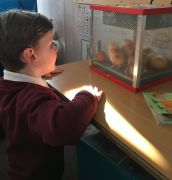 At Reed First school, we believe that children in the EYFS need to experience a wide variety of first hand, practical learning opportunities to enable them to develop to their full potential. We aim to provide a secure, enjoyable and caring educational environment where each child feels valued. We follow children’s interests and provide opportunities throughout our EYFS curriculum to support learning, consolidate and deepen knowledge and ensure children meet their next steps. There is an emphasis on developing children’s ability to express themselves, communicate clearly and develop strong relationships, together with focused phonics teaching this allows children at the end of Reception to be ready to face the increased challenges of Year 1.
At Reed First school, we believe that children in the EYFS need to experience a wide variety of first hand, practical learning opportunities to enable them to develop to their full potential. We aim to provide a secure, enjoyable and caring educational environment where each child feels valued. We follow children’s interests and provide opportunities throughout our EYFS curriculum to support learning, consolidate and deepen knowledge and ensure children meet their next steps. There is an emphasis on developing children’s ability to express themselves, communicate clearly and develop strong relationships, together with focused phonics teaching this allows children at the end of Reception to be ready to face the increased challenges of Year 1.
We celebrate the uniqueness of each child, recognising they all learn and develop in different ways, at different rates and bring diverse knowledge and experiences to our school. We have the highest aspirations for every child, believing that they should be empowered to take ownership of their learning and their environment. We believe that risk and challenge are vital in order for our children to develop critical thinking, resilience and perseverance.
Implementation:
We use ‘Development Matters,’ non-statutory curriculum guidance for the EYFS, to support us in the delivery of the EYFS learning and development requirements, with a significant emphasis on learning through play.
EYFS principles
Four guiding principles shape practice in our early years setting.
These are:
- every child is a unique child, who is constantly learning and can be resilient, capable, confident and self-assured
- children learn to be strong and independent through positive relationships
- children learn and develop well in enabling environments, with teaching and support from adults, who respond to their individual interests and needs and help them to build their learning over time and where there is a strong partnership between staff and parents and/or carers
- children develop and learn in different ways (see ‘the characteristics of effective learning’) and at different rates
Characteristics of Effective Learning
The characteristics of effective learning describe how a child learns
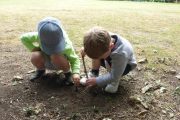 Playing and exploring – children use all their senses to investigate and experience things, and ‘have a go’
Playing and exploring – children use all their senses to investigate and experience things, and ‘have a go’
- Finding out and exploring
- Playing with what they know
- Being willing to have a go
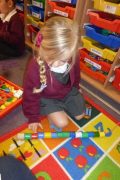 Active Learning – children concentrate and keep on trying if they encounter difficulties, and enjoy achievements
Active Learning – children concentrate and keep on trying if they encounter difficulties, and enjoy achievements
- Being involved and concentrating
- Keeping trying
- Enjoying achieving what they set out to do
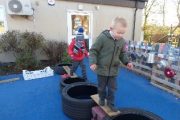
Creating and thinking critically – children have and develop their own ideas, problem solve, make links between ideas, and develop strategies for doing things
- Having their own ideas
- Making links
- Choosing ways to do things
The Areas of Learning and Development
There are seven areas of learning that and development that make up the Early Years Foundation Stage. All areas are important and inter-connected.
Three areas are particularly crucial for building children’s capacity to learn, form relationships and thrive. These three areas are known as the prime areas;
- Communication and language;
- Physical development;
- Personal, social and emotional development.
In addition, there are four specific areas through which the three prime areas are strengthened and applied. These are:
- Literacy;
- Mathematics;
- Understanding the world;
- Expressive arts and design.
The prime areas of learning are the foundation for all future learning and therefore we place high priority on ensuring that all children feel, happy, secure and settled into the school environment.
To support children’s development, the adults consider the individual needs, interests and each child’s stage of development. They then use this information to provide a challenging and inspiring curriculum for all children. We plan the curriculum with the children’s interests in mind, alongside our termly themes and topics.
The EYFS is a play-based curriculum and the children learn through a range of play-based opportunities as well as adult led and independent activities. In the Early Years our aim is to ensure the children have fun and are given opportunities to experience as many ‘hands on’ activities. Through play your child will learn to take turns and share, listen to each other, negotiate, cooperate and much, much more.
Each week the children will have opportunities to experience all the areas of Learning and Development of the Early Years Foundation Stage Curriculum. The children learn through a mixture of daily adult-led group times, weekly adult-led focus activities, targeted activities and child-initiated learning.
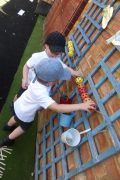
Learning is provided for by carefully planned and stimulating areas. Children are encouraged to access a range of areas over the week and are supported in becoming independent learners. The children have frequent opportunities to initiate their own learning during independent time. The adults work to extend this learning through supporting play, using children’s ideas to plan for future provision and enabling children to become independent learners with the ability to access resources and develop and explore their own ideas.
We strongly believe in the importance of outdoor learning and outdoor play features heavily in the Foundation curriculum. The outside provision is carefully planned to support learning and all seven areas of learning are incorporated into the outdoor curriculum. In addition to Forest school sessions, the children have the opportunity to use the outside learning area daily. We operate a free flow system where by children may choose to play inside or outside. There are plenty of opportunities for children to work and play together as well as the time and space for children to challenge themselves. Our children learn to take risks in a safe and controlled environment. This has a huge impact on their self-esteem and their resilience for learning.
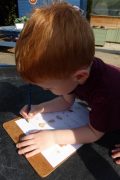
The daily timetable changes over the course of the year, with the emphasis on transition and learning through play in the Autumn Term, gradually building up to longer adult led lessons during the Summer Term.
Assessment plays an important part in helping the teachers to recognise the children’s progress, understand their needs, and to plan activities and support. Ongoing assessment is an integral part of the learning and development process. It involves the adults knowing children’s level of achievement and interests, and then shaping teaching and learning experiences for each child reflecting that knowledge. In our daily interactions with children, adults respond to their day-to-day observations about children’s progress.
We keep parents and carers informed and up-to-date with their child’s progress and development. This includes informal discussions at drop off and collection time and through the Home School Communication book, postcards home, the Google classroom, 2 parent consultations and an annual report. The Reception Baseline Assessment (RBA) is a short assessment, taken in the first six weeks in which a child starts reception. In the final term of the year in which the child reaches age five, the EYFS Profile is completed for each child. The Profile provides parents and teachers with a picture of the child’s knowledge, understanding and abilities and their attainment against expected levels, and their readiness for year 1.
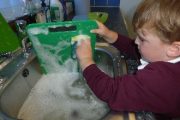
Useful websites:
What to expect in The Early Years Foundation stage – parent’s guide.
